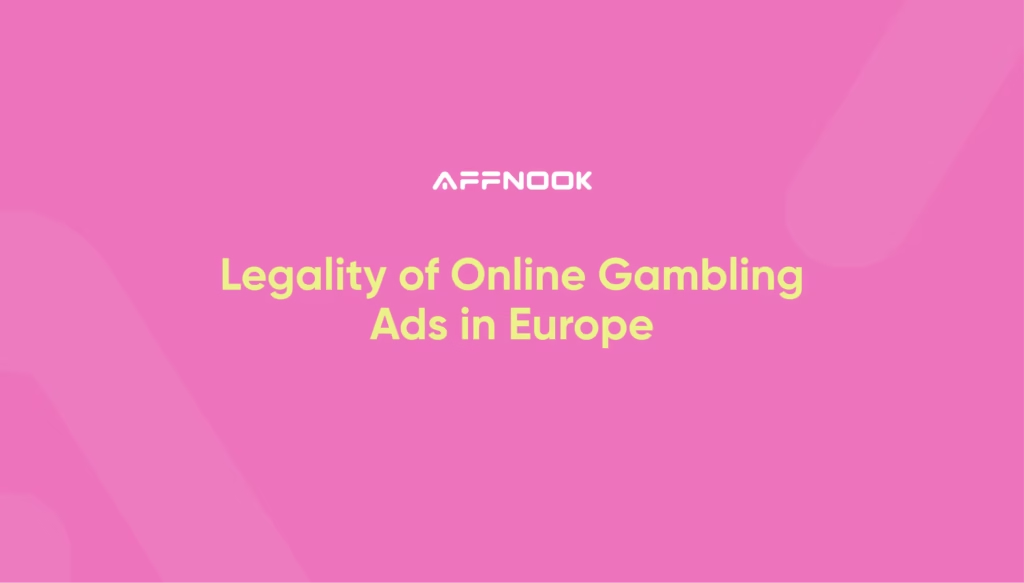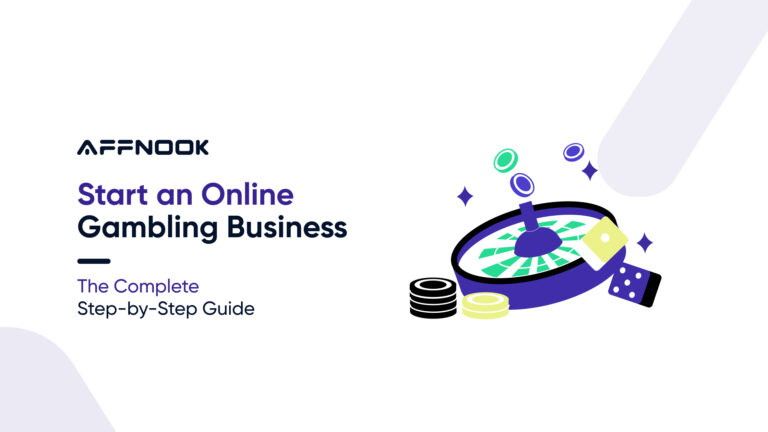Imagine you are the digital marketing manager of a growing iGaming brand.
You have just launched a new eye-catching online gambling campaign, which has performed very well in the Malta region. After analyzing its performance, you have decided to expand the campaign to other regions such as Germany, Sweden, and Spain.
After the success of this campaign, it makes sense to expand your campaign to the Malta region.
However, your rapid growth hits a roadblock. Instead of scaling successfully, your campaigns start triggering warnings, legal notices, and even heavy penalties.
What went wrong?
You’ve entered one of Europe’s most complicated and misunderstood advertising environments — the legal landscape of online gambling ads.
Despite being part of the same economic zone, each EU member state controls its own gambling laws and regulations. That means what’s perfectly legal in one country can be completely banned in another. It is just not a matter of language; it is a matter of law.
Let’s break down the legal landscape and look at what operators need to know when promoting online gambling in Europe.
Why is EU Gambling Advertising So Complicated
In the EU market, most of the industries follow a single rule, with only the gambling industry being an exception. Here each member of the state is setting their own rules for licensing, advertising, and enforcement. While there are EU laws protecting consumer rights and data privacy (like GDPR), iGaming advertising falls under national law.
This creates a fragmented ecosystem where:
- Regulations vary from country to country
- What’s allowed in one state may be illegal in another
- Advertisers must adapt messaging, targeting, and timing based on local laws
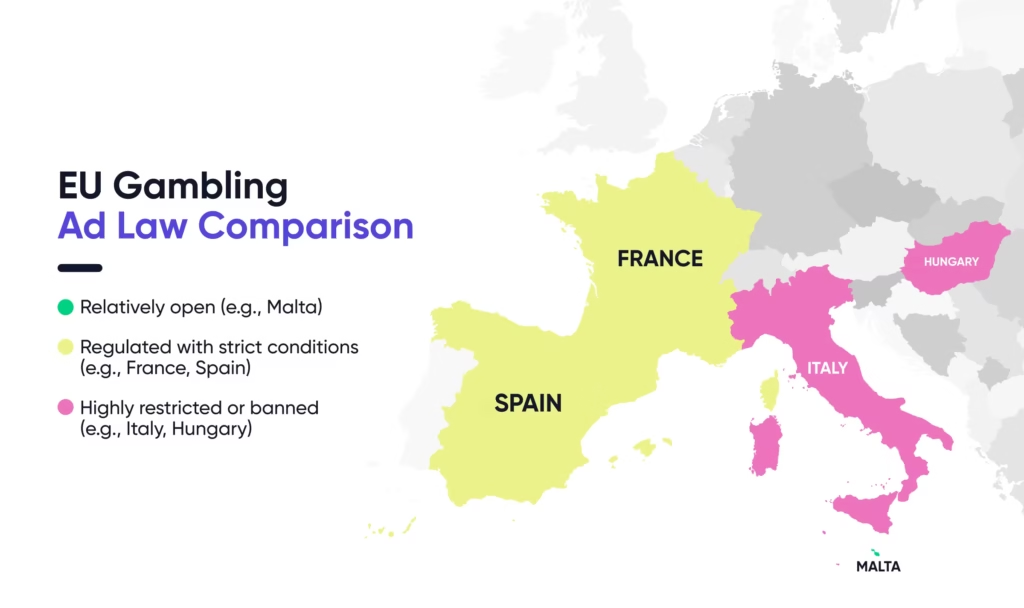
Country-by-Country Breakdown: What You Can and Can’t Do
Germany:
For years, online gambling in Germany operated in a grey area. Each state has its own rules, which create lots of confusion and frustration among operators, and they are trying to stay within legal boundaries. But it was changed in July 2021 when the country introduced the nationwide law called the State Treaty on Gambling. And the end goal of the rule is to set a standard for everyone.
Since then, the way gambling can be advertised in Germany has become much stricter. Here’s what’s important to know:
Time limits: The European Union has put restrictions on running gambling ads on TV, Radio, and on the internet between 6 AM to 9 PM. This rule is made to reduce the chances of seeing gambling ads by teenagers and young people.
Ad Content Rules: Gambling ads should be clear and honest. Do not showcase that gambling is the only way to earn money. Or, while promoting ads, you have to showcase warning messages about excessive gambling and where to get help.
No Bonus Promotions: While promoting ads, operators can not advertise bonuses like free bets or loyalty programs. These offers are often seen as more encouraging of too much gambling, especially for new players.
No Direct Targeting: As per government rules, gambling companies are not allowed to target their audience directly through ads. This means no personal message or offers based on someone’s past behaviour.
Understanding the legality of online gambling ads in Germany is crucial. If a company violates these regulations, it will face serious consequences.
Sweden:
Sweden has one of the highest rates of online gambling in Europe. According to a report by SIGMA, online gambling accounted for over 76% of Sweden’s total Gross Gaming Revenue (GGR)—meaning most of the country’s gambling income came from online betting and gaming activities.
To better manage this growing segment, Sweden restructured its gambling market in 2019, opening it up to more licensed operators while focusing strongly on protecting players.
Even though the market is open, Sweden has strict advertising rules:
Moderate marketing: Gambling ads must be calm and reasonable. They can not be flashy, overly emotional, or make gambling seem like a quick solution to a money problem.
No Bonus Offers: Just like Germany, Sweden also has strict rules against offering bonuses and promotions to attract new players. The goal is to stop people from excessive gambling.
Responsible Gambling Is a Must: All advertisements must include clear information about responsible gambling or self-exclusion services so that players can take a break from gambling.
No Ads for Minors: Ads must not target minor people under the age of 18 or people who have blocked themself from gambling.
Malta:
Malta is home to many gambling companies, largely due to its well-established licensing framework managed by the Malta Gaming Authority (MGA). While the country offers a relatively flexible approach to licensing, brands operating from Malta must still carefully examine the legality of online gambling ads to ensure they meet both local and international advertising standards.
Compared to the EU and other countries, Malta’s advertising rules are relatively less strict.Still, operators and brands must focus on responsible marketing. Here’s what they include:
Ads Must Be Fair and Honest: Advertising should never be misleading or push people to gamble in a reckless way.
Protecting Minors: Strict regulation makes sure that gambling ads will not target minors.
Clear Terms for Promotions: If a promotion is being advertised, the terms and conditions must be easy to find and understand.
France
It follows a state-controlled model when it comes to gambling. There are only certain types that are allowed online, like sports betting and horse racing. Others, like online casino games, are mostly banned. Because of this, advertising is also more limited.
Here is the breakdown of the main rules in France:
Specific Product Focus: Gambling ads in France are only allowed for types of gambling that are legal in the country like sports betting and horse racing. Promoting products that are banned, such as online casino games, is not allowed.
Limited Sponsorships: France has placed limits on gambling sponsorships, especially in sports, to reduce how often young people and vulnerable audiences are exposed to gambling promotions.
Spain
Spain has taken very aggressive action against gambling advertising in recent years. A new Royal Decree 444/2024 introduced some of the strongest advertising restrictions in all of Europe.
Here is the breakdown of the rules look like:
No Celebrity Endorsements: Gambling ads cannot feature celebrities, athletes, or influencers. This rule is meant to stop people, especially young audiences, from being influenced by famous faces.
Late-Night Ads Only: Gambling ads on TV, radio, or YouTube are only allowed between 1 AM and 5 AM, a time when fewer people, especially minors, are likely to be watching.
No Public Bonus Promotions: Operators can’t advertise welcome bonuses, sign-up deals, or loyalty rewards in public ads. These offers can only be shown in private channels, like direct messages or logged-in areas.
No Sports Sponsorships: Gambling brands can’t sponsor sports teams, jerseys, or stadiums. This limits how often the public sees gambling-related branding during games and events.
Dos and Don’ts of Gambling Ads in the EU
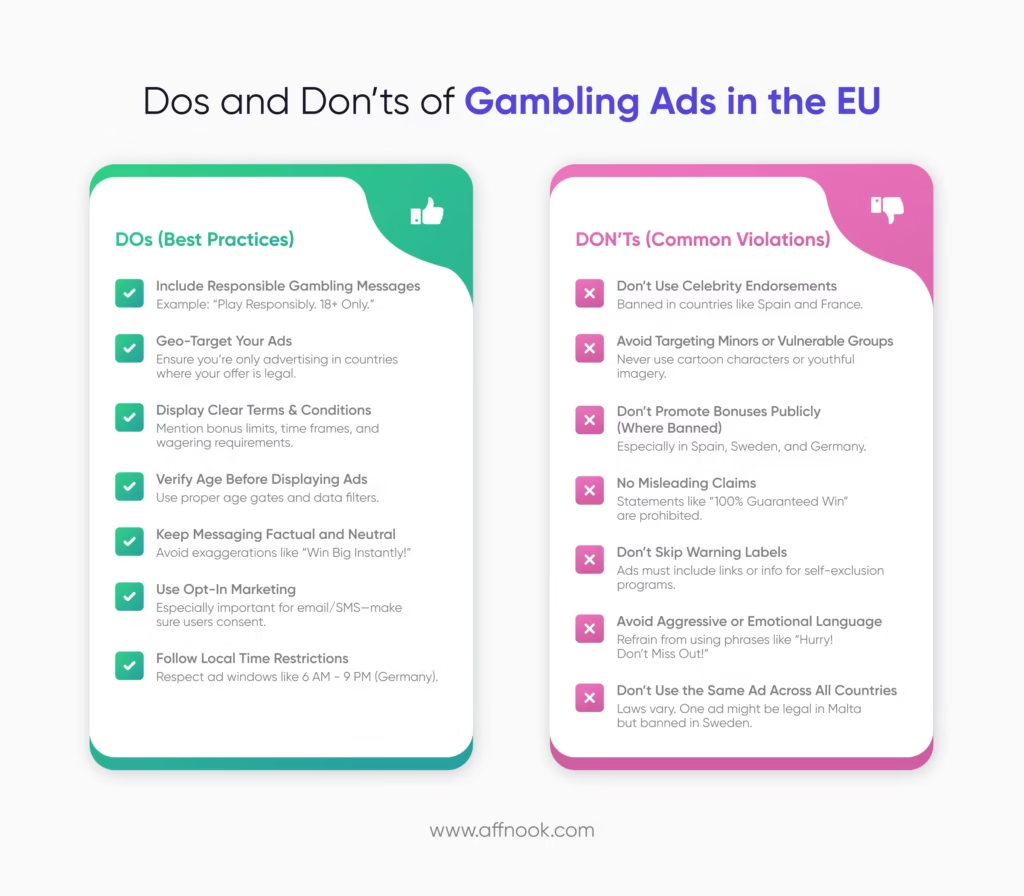
One Campaign, Five Countries: How Rules Change Across the EU
Advertising in the EU is not just one rule that works in all cases. What works in Malta might break the rules in Sweden, and a perfectly legal ad in Germany could be banned in Spain. To stay compliant across the border, gambling operators must make their campaigns based on the legality of online gambling ads in each country.
Let‘s imagine there is a European iGaming brand that wants to just launch a new online sportsbook. While their offer is the same, the way they promote it differs from one country to another like different taglines, time slots, audiences, platforms, etc.
Here’s how the same campaign would look when customized for five different EU markets:
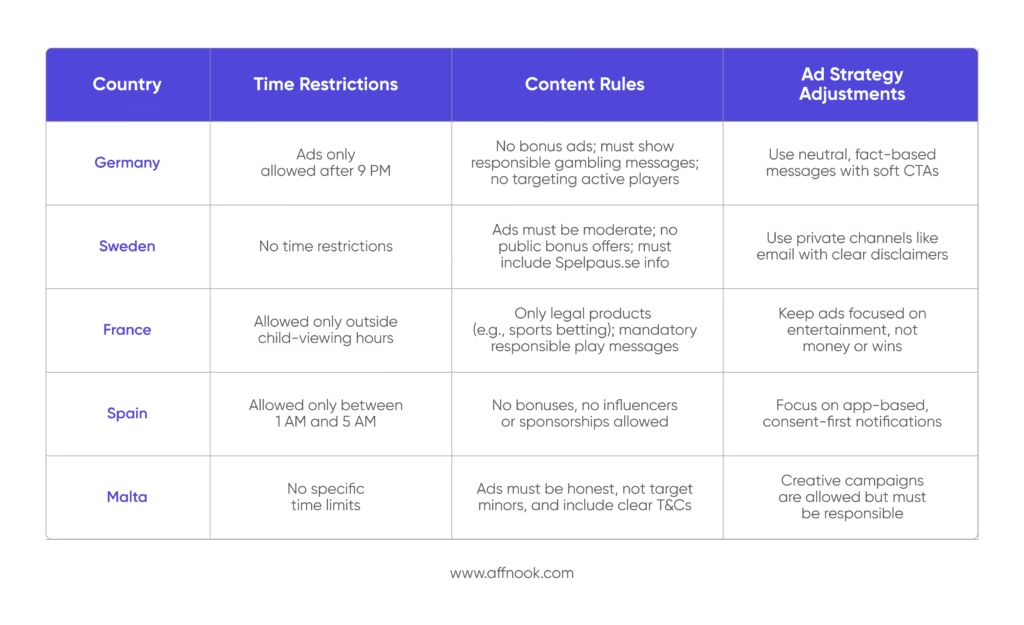
Common Pitfalls and Best Practices for Operators
Running gambling ads across the EU can be tricky. Each country has its own rules, and even a small difference can create a big problem if you are not properly aware. So, a campaign that works well in one state can create a legal consequence in another state. That’s why it is very important to understand the legality of online gambling ads.
Common Pitfalls:
Creating one ad for everywhere: The biggest mistake of many iGaming operators is that they can use one campaign for everywhere, but every country has its own rules. So this approach will not work.
Ignoring Indirect Ads: Ads that come from influencers or content creators (not directly from the brand) are also being watched closely by regulators.
Skipping Responsible Gambling Messages: Forgetting to add warnings or links to help tools is a common mistake that gets noticed quickly.
Relying Too Much on Bonuses: Some countries ban or limit bonus promotions. Promoting them too heavily can lead to serious trouble.
Best Practices for Operators:
Customize for Each Country: Before showcasing the ads operator has to change the ad’s language, images, offers, and style to match the laws and culture of each country.
Get Legal Advice Locally: Work with legal experts in each country to make sure your ads follow the rules. It’s not just helpful, it’s necessary.
Player Protection First: Make responsible gambling tools easy to find. Add age checks, self-exclusion options, and support links to all your ads and platforms.
Be Clear and Honest: If you’re running promotions, make sure the terms and conditions are easy to understand. No fine print tricks.
By avoiding these common mistakes and following these simple steps, operators can respect the legality of online gambling ads while building a strong and trusted presence in the EU market.
How These Rules Are Affecting the Market
As we know, each country has its own rules, which creates challenges for the online gambling industry
- Higher Compliance Costs
iGaming brands have to invest more money to hire legal experts, special tools for promoting ads at the right place, so this can be very handy for small businesses who are in their growing stage.
- Less Ad Spending in Some Countries
In countries with strict advertising bans like Italy, gambling companies have limited options to promote their services. Even though Italy was the largest gambling market in Europe in 2023, with €21 billion in Gross Gaming Revenue, operators can’t invest heavily in ads. As a result, many are turning to brand partnerships and creative collaborations to maintain visibility.
3. Risk of Black Market Growth
One big concern is that when legal gambling ads are blocked, people may turn to illegal gambling websites. These sites aren’t licensed, don’t follow safety rules, and can be dangerous for players. Groups like the European Gaming and Betting Association (EGBA) warn that too many restrictions can push players toward these unregulated options.
4. Stronger Focus on Player Safety
Tougher regulations are pushing the industry to put more effort into protecting players, even if each country has different ways of doing it.
Conclusion
The legality of online gambling ads in the European region is complex. Each country has its own rules and regulations, some are strict and some are relaxed. So that gambling companies need to be very careful about what, where, and when they are advertising.
As we’ve seen in this guide, what’s allowed in one country, like Germany, might be completely restricted in another, such as Spain. Sweden focuses heavily on player protection, while Malta has a more open approach, though it still enforces clear rules. That’s why using the same ad across all countries simply doesn’t work.
To succeed in the region, a gambling operator must:
- Learn the local laws in every country where they want to advertise
- Put player safety first by promoting responsible gaming
- Adjust campaigns to fit each market’s culture and rules
Even though it’s challenging, companies that plan carefully and follow the rules can still grow and build trust across Europe. With the right approach, it’s possible to stay compliant and succeed in this ever-changing market.
Help Section
1. Why does the legality of online gambling ads differ across EU countries?
The legality of online gambling ads varies because gambling regulations are managed individually by each EU member state. While the European Union oversees areas like data protection and consumer safety, gambling advertising falls under national control. This creates a fragmented environment where every country—like Germany, Sweden, and Spain—sets its own rules.
2. Can I use one ad campaign for all EU countries?
No, using a single campaign across multiple countries often leads to compliance issues. The legality of online gambling ads changes from one country to another. For example, while Malta allows more flexible ad content, Sweden and Spain enforce strict limits on bonuses, endorsements, and broadcast times. Each campaign must be localized to align with local laws and cultural expectations.
3. What happens if a brand violates the legality of online gambling ads in a country?
Violating the legality of online gambling ads can result in heavy penalties such as large fines, license suspension, or legal warnings from regulators. In severe cases, operators may even lose their ability to promote or operate in that region, damaging both reputation and revenue potential.
4. Which EU countries are the most strict or relaxed about the legality of online gambling ads?
When it comes to the legality of online gambling ads, countries like Spain, France, and Germany are among the strictest—restricting ad timing, banning celebrity endorsements, and limiting bonus promotions. Meanwhile, Malta offers a more flexible system, allowing responsible and transparent advertising under its Malta Gaming Authority (MGA) guidelines.
5. How can operators stay compliant with the legality of online gambling ads across the EU?
To ensure compliance with the legality of online gambling ads, operators should work with local legal experts, review each country’s specific advertising code, and adjust campaigns accordingly. Including responsible gambling messages, clear terms, and age restrictions in every ad helps maintain compliance and protect brand integrity.
